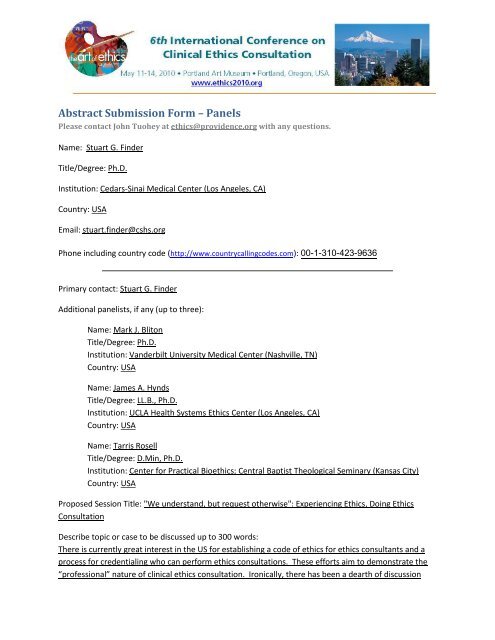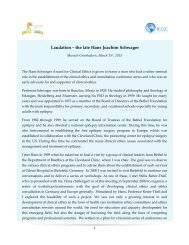Abstract No_ 74.pdf - International Conference on Clinical Ethics ...
Abstract No_ 74.pdf - International Conference on Clinical Ethics ...
Abstract No_ 74.pdf - International Conference on Clinical Ethics ...
Create successful ePaper yourself
Turn your PDF publications into a flip-book with our unique Google optimized e-Paper software.
<str<strong>on</strong>g>Abstract</str<strong>on</strong>g> Submissi<strong>on</strong> Form – Panels<br />
Please c<strong>on</strong>tact John Tuohey at ethics@providence.org with any questi<strong>on</strong>s.<br />
Name: Stuart G. Finder<br />
Title/Degree: Ph.D.<br />
Instituti<strong>on</strong>: Cedars-Sinai Medical Center (Los Angeles, CA)<br />
Country: USA<br />
Email: stuart.finder@cshs.org<br />
Ph<strong>on</strong>e including country code (http://www.countrycallingcodes.com): 00-1-310-423-9636<br />
Primary c<strong>on</strong>tact: Stuart G. Finder<br />
Additi<strong>on</strong>al panelists, if any (up to three):<br />
Name: Mark J. Blit<strong>on</strong><br />
Title/Degree: Ph.D.<br />
Instituti<strong>on</strong>: Vanderbilt University Medical Center (Nashville, TN)<br />
Country: USA<br />
Name: James A. Hynds<br />
Title/Degree: LL.B., Ph.D.<br />
Instituti<strong>on</strong>: UCLA Health Systems <strong>Ethics</strong> Center (Los Angeles, CA)<br />
Country: USA<br />
Name: Tarris Rosell<br />
Title/Degree: D.Min, Ph.D.<br />
Instituti<strong>on</strong>: Center for Practical Bioethics; Central Baptist Theological Seminary (Kansas City)<br />
Country: USA<br />
Proposed Sessi<strong>on</strong> Title: "We understand, but request otherwise": Experiencing <strong>Ethics</strong>, Doing <strong>Ethics</strong><br />
C<strong>on</strong>sultati<strong>on</strong><br />
Describe topic or case to be discussed up to 300 words:<br />
There is currently great interest in the US for establishing a code of ethics for ethics c<strong>on</strong>sultants and a<br />
process for credentialing who can perform ethics c<strong>on</strong>sultati<strong>on</strong>s. These efforts aim to dem<strong>on</strong>strate the<br />
“professi<strong>on</strong>al” nature of clinical ethics c<strong>on</strong>sultati<strong>on</strong>. Ir<strong>on</strong>ically, there has been a dearth of discussi<strong>on</strong>
over the past decade (as dem<strong>on</strong>strated by a thorough review of the literature) of the ethical<br />
underpinnings associated with practices and methods for actually doing ethics c<strong>on</strong>sultati<strong>on</strong>. Thus, at the<br />
very moment when clamors for “professi<strong>on</strong>alizati<strong>on</strong>” are reaching a fevered pitch, explorati<strong>on</strong> of the<br />
ethical bases of actual clinical practices associated with ethics c<strong>on</strong>sultati<strong>on</strong> are near absent. The sessi<strong>on</strong><br />
is explicitly aimed toward a critical (in the philosophical sense of the word) explorati<strong>on</strong> of issues of<br />
practice in clinical ethics c<strong>on</strong>sultati<strong>on</strong>. It sets out to do so, however, not from a theoretical stance but<br />
from within the perspective of actual clinical ethics engagement.<br />
The substantive frame for this sessi<strong>on</strong> is the noti<strong>on</strong> that the clinical role of ethics c<strong>on</strong>sultants is to<br />
initiate c<strong>on</strong>versati<strong>on</strong>s and direct deliberati<strong>on</strong>s about what is most worthwhile to the primary decisi<strong>on</strong>makers<br />
in a particular situati<strong>on</strong> in order to help identify and clarify what needs specific notice and<br />
attenti<strong>on</strong> within the moral perspectives associated with decisi<strong>on</strong>-making. As such, ethics c<strong>on</strong>sultants<br />
attempt to pick out key decisi<strong>on</strong>-points and opti<strong>on</strong>s and subsequently help others envisi<strong>on</strong> opti<strong>on</strong>s and<br />
outcomes in light of those others' own c<strong>on</strong>cerns and values so as to find which seem most reas<strong>on</strong>able<br />
for them.<br />
However, as a resp<strong>on</strong>sible participant, the ethics c<strong>on</strong>sultant must also be able to account for his own<br />
substantive commitments. In this way, the practice of ethics c<strong>on</strong>sultati<strong>on</strong> entails the necessity and<br />
ability to give reflective accounts of the activities of c<strong>on</strong>sultati<strong>on</strong> itself, especially with regard to what<br />
happens to the c<strong>on</strong>sultants as a result of his own participati<strong>on</strong>.<br />
Describe briefly each proposed panelist’s positi<strong>on</strong> to be offered (up to 300 words):<br />
Beginning with a general introducti<strong>on</strong> outlining the sessi<strong>on</strong>’s aim, Finder will present a brief scenario<br />
drawn from a c<strong>on</strong>sultati<strong>on</strong> in which he was involved. The patient in this situati<strong>on</strong> was an elderly Persian<br />
woman whose three children (oldest daughter, youngest daughter, s<strong>on</strong>) were struggling with how best<br />
to proceed in light of her metastatic cancer and in the face of what they perceived to be a lack of<br />
interest from the nursing and medical staff toward their mother. Finder’s presentati<strong>on</strong> will focus <strong>on</strong> his<br />
interacti<strong>on</strong> with the children, at several different points in time, and it will be much more narrative than<br />
“case report” and thus will be clearly couched in the first pers<strong>on</strong>, experiential voice.<br />
Next, Hynds and Rosell (in this order) will resp<strong>on</strong>d to what Finder has presented. Each will outline what<br />
he sees as important/significant/problematic in Finder’s interacti<strong>on</strong> with the patient’s children as it<br />
pertains to the practice of clinical ethics c<strong>on</strong>sultati<strong>on</strong>. Each will also discuss why what he identifies as<br />
important/significant/problematic warrants being explicitly noted and what the ethical significance<br />
might be in such noting.<br />
Next, Blit<strong>on</strong> will resp<strong>on</strong>d to the issue presented by Hynds and Rosell, with a critical eye toward what<br />
those c<strong>on</strong>siderati<strong>on</strong>s indicate about the clinical practice of ethics c<strong>on</strong>sultati<strong>on</strong> more generally and what<br />
they further reflect about the “ethics” of ethics c<strong>on</strong>sultati<strong>on</strong> itself.
Finally, the audience will be invited to resp<strong>on</strong>d to the c<strong>on</strong>sultati<strong>on</strong> scenario which was presented, the<br />
resp<strong>on</strong>ses to that scenario, and the reflecti<strong>on</strong> up<strong>on</strong> those resp<strong>on</strong>ses. The audience will also be asked to<br />
comment <strong>on</strong> whether (and how) the issues and questi<strong>on</strong>s advanced in this kind of critical examinati<strong>on</strong> of<br />
clinical ethics practice pertain to their own commitments regarding their engagement in clinical ethics<br />
c<strong>on</strong>sultati<strong>on</strong>.<br />
Are you planning to or will you be willing to submit a poster al<strong>on</strong>g with your panel?<br />
Yes <str<strong>on</strong>g>No</str<strong>on</strong>g>




